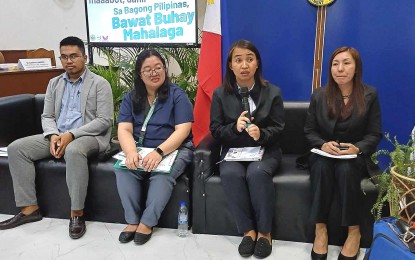
HEALTH BRIEFING. The Regional Epidemiology and Surveillance Unit of the Department of Health-Cordillera Administrative Region urges early medical intervention if one is ill to prevent complications. Karen Lonogan (3rd from left), Regional Epidemiology and Surveillance Unit chief, said during the “Kapihan sa Bagong Pilipinas” briefing in Baguio City on Tuesday (July 2, 2024) that only 82 percent of patients with dengue-related symptoms in the region sought medical consultations for the first half of the year. (Photo courtesy of Carlito Dar-PIA CAR)
BAGUIO CITY – The Regional Epidemiology and Surveillance Unit (RESU) of the Department of Health-Cordillera Administrative Region (DOH-CAR) said immediate medical consultation is a must amid rising dengue cases
“Only 82 percent of those who experienced dengue-related symptoms actually sought medical consultation,” RESU chief Karen Lonogan said during the “Kapihan sa Bagong Pilipinas” press briefing here on Tuesday.
DOH-CAR data show there were 3,922 dengue cases and four deaths recorded from January to June this year, a 71-percent increase compared to the 2,287 cases during the same period last year.
Lonogan said the same trend was recorded in the last two weeks, with all the provinces and this city recording an uptrend.
For the last two weeks, Apayao recorded a 167 percent increase; Benguet, 109 percent; Baguio City, 97 percent; Kalinga, 86 percent; Ifugao, 79 percent; Abra, 56 percent; and Mountain Province, 52 percent.
“We might see the numbers as mere numbers but they actually mean lives being lost or resources being depleted if more cases will become severe due to the late or non-seeking of medical consultation among persons experiencing the symptoms of the illness,” she said.
Lonogan said that of the 82 percent who sought medical consultation, 42 percent were confined in a medical facility due to severe cases, which could have been prevented had the patients sought early intervention.
She said the number of confinements translates to medical health bed utilization, which could affect the medical facilities’ provisions for beds for those who are more in need of hospital care.
“Let us help each other. Avoid delaying medical consultation when you feel ill. We have health facilities that will provide free services and medicines if needed. Let us avail of them and not wait that our conditions are aggravated,” she said.
Lonogan also appealed to the Department of the Interior and Local Government and different local government units to encourage communities to participate in cleanliness effort to destroy possible mosquito breeding grounds.
“This is a year-round illness so we should not renege on our cleanliness effort. Everyone must participate for their own protection and that of their families. It is possible that while a household is regularly cleaning but if their neighbors are not, then the breeding sites could affect the neighborhood,” she pointed out. (PNA)
